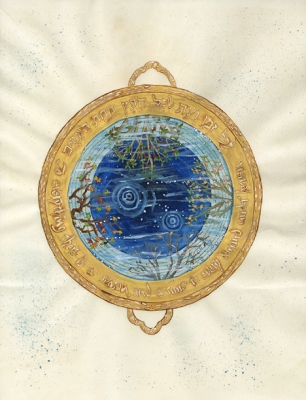Qohelet: Searching for a Life Worth Living
Qohelet: Searching for a Life Worth Living
Debra Band and Menachem Fisch
Reviewed by Morton Leibowitz
Few books in the Jewish canon are as challenging both emotionally and intellectually as the Book of Qohelet. (Please note the spelling Qohelet will be used throughout this review as it is in the present volume.) The opening sentence and tradition would make claim that the book was authored by King Solomon, the wisest of all men at the end of his life – and yet actual authorship is still uncertain. Much debate exists as to why a volume devoted to wide ranging despair and to the angst associated with man's transient existence, should not only be included in the canon but also incorporated into the service during Succoth, one of the most festive of the Jewish Holidays.
These thoughts are provoked by the very recent publication of an exquisitely illuminated text of Qohelet with artwork done by Debra Band and an accompanying philosophical commentary by her second cousin, Prof Menachem Fisch, Raanana resident, and Professor emeritus of Philosophy at Tel Aviv University.
Debra Band is a well-established artist in the U.S. who since 1987 has been focused on Hebrew manuscript illumination. Descended from an eminent rabbinic family, her extensive studies of Jewish texts and research into medieval European and middle Eastern painting and manuscripts inform her work. Every page of this new edition of Qohelet has an original illuminated image which projects symbolically the contents of that page of text. Even more gratifying, she includes an extensive explanation of all the allusions and symbolism that she built on in creating the image. Her drawings and insights provide exciting understanding of both the present text of Qohelet and the role of illumination in underscoring mood and message.
Prof Menachem Fisch is the Joseph and Ceil Mazer Professor Emeritus of History and Philosophy of Science, and the Director of the Center for Religious and Interreligious Studies at Tel Aviv University. His early career focused on the history of 19th century British science and mathematics, on confirmation theory and rationality and on the complexities of rational thinking. This brought him to the study of rational thought in Rabbinic literature and the limits of normative self-criticism, the Talmud's dispute of religiosity, the possibilities of articulating a pluralist political philosophy from within the assumptions of halakhic Judaism, and the history and philosophy of scientific framework transitions
His analysis of Qohelet in the present volume is unique, innovative, comprehensive and, as he explains in the author's note in reference to his father's (Harold Fisch) work ….. "He read Qohelet like no one before him bringing his profound knowledge of late renaissance humanism to bear on the text. His brief mention of Popper toward the end offered me a much-needed entry point. Coming to terms with my father's ingenious reading of Qohelet left me love-struck by the book, not because I thought he had got it right, but because I believed he hadn't. The paper I presented at the conference marked a first and crucial step toward articulating an alternative reading I could live with; an undertaking that reaches its current state of fruition, dear reader, in the present volume."
The present volume can be ordered from Amazon or direct from the publisher Baylor University Press. Highly recommended as an impressive artistic addition to one's library and as providing an innovative, unique and comprehensive analysis of a challenging text.









Comments